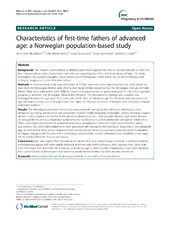| dc.description.abstract | Background: The modern phenomenon of delayed parenthood applies not only to women but also to men, but less is known about what characterises men who are expecting their first child at an advanced age. This study investigates the sociodemographic characteristics, health behaviour, health problems, social relationships and timing of pregnancy in older first-time fathers. Methods: A cross-sectional study was conducted of 14 832 men who were expecting their first child, based on data from the Norwegian Mother and Child Cohort Study (MoBa) carried out by the Norwegian Institute of Public Health. Data were collected in 2005–2008 by means of a questionnaire in gestational week 17–18 of their partner’ s pregnancy, and from the Norwegian Medical Birth Register. The distribution of background variables was investigated across the age span of 25 years and above. Men of advanced age (35–39 years) and very advanced age (40 years or more) were compared with men aged 25–34 years by means of bivariate and multivariate logistic regression analyses. Results: The following factors were found to be associated with having the first child at an advanced or very advanced age: being unmarried or non-cohabitant, negative health behaviour (overweight, obesity, smoking, frequent alcohol intake), physical and mental health problems (lower back pain, cardiovascular diseases, high blood pressure, sleeping problems, previous depressive symptoms), few social contacts and dissatisfaction with partner relationship. There were mixed associations for socioeconomic status: several proxy measures of high socioeconomic status (e.g. income >65 000 €, self-employment) were associated with having the first child at an advanced or very advanced age, as were several other proxy measures of low socioeconomic status (e.g. unemployment, low level of education, immigrant background).The odds of the child being conceived after in vitro fertilisation were threefold in men aged 34–39 and fourfold from 40 years and above. Conclusions: Men who expect their first baby at an advanced or very advanced age constitute a socioeconomically heterogeneous group with more health problems and more risky health behaviour than younger men. Since older men often have their first child with a woman of advanced age, in whom similar characteristics have been reported, their combined risk of adverse perinatal outcomes needs further attention by clinicians and researchers. | en_US |

